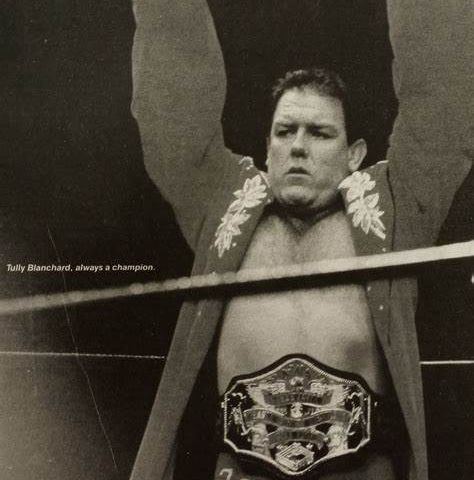Tully Blanchard shoot interview

Download and listen anywhere
Download your favorite episodes and enjoy them, wherever you are! Sign up or log in now to access offline listening.
Tully Blanchard shoot interview
This is an automatically generated transcript. Please note that complete accuracy is not guaranteed.
Description
Tully Arthur Blanchard (born January 22, 1954) is a Canadian-American https://en.wikipedia.org/wiki/Professional_wrestling and https://en.wikipedia.org/wiki/Manager_(professional_wrestling). He is best known for his appearances with https://en.wikipedia.org/wiki/Jim_Crockett_Promotions and the https://en.wikipedia.org/wiki/WWE in the mid-to-late 1980s as...
show moreAs the son of wrestling promoter and former https://en.wikipedia.org/wiki/American_Wrestling_Association star https://en.wikipedia.org/wiki/Joe_Blanchard, Tully Blanchard was involved in professional wrestling at a very young age. He began selling programs and refreshments at the arenas at the age of ten, and worked as a referee when he was older. Blanchard attended https://en.wikipedia.org/wiki/West_Texas_A%26M_University, where he played https://en.wikipedia.org/wiki/American_football, first as a https://en.wikipedia.org/wiki/Quarterback and then as a https://en.wikipedia.org/wiki/Defensive_end, alongside fellow future wrestlers https://en.wikipedia.org/wiki/Tito_Santana and https://en.wikipedia.org/wiki/Ted_DiBiase.
Blanchard was trained to wrestle by his father and https://en.wikipedia.org/wiki/Jos%C3%A9_Lothario, debuting in 1975 in his father's promotion, https://en.wikipedia.org/wiki/Southwest_Championship_Wrestling, where he also held a number of backstage production and creative positions. He began his career as a face by https://en.wikipedia.org/wiki/Tag_team with his father in a feud against https://en.wikipedia.org/wiki/Dory_Funk,_Jr. and https://en.wikipedia.org/wiki/Terry_Funk. Between 1978 and 1983, Blanchard held the https://en.wikipedia.org/wiki/SCW_Southwest_Heavyweight_Championship and https://en.wikipedia.org/wiki/SCW_Southwest_Heavyweight_Championship on seven occasions. He formed heel tag team with https://en.wikipedia.org/wiki/Gino_Hernandez, "The Dynamic Duo". They held the https://en.wikipedia.org/wiki/Texas_All-Star_USA_Tag_Team_Championship on five occasions and the https://en.wikipedia.org/wiki/SCW_World_Tag_Team_Championship on one occasion in the early 1980s. Blanchard came to https://en.wikipedia.org/wiki/Jim_Crockett,_Jr.'s https://en.wikipedia.org/wiki/Jim_Crockett_Promotions (MACW) in early 1984. Blanchard immediately entered into a feud with https://en.wikipedia.org/wiki/Mark_Youngblood over the https://en.wikipedia.org/wiki/WCW_World_Television_Championship, which would later be renamed the NWA World Television Championship and WCW World Television Championship. Blanchard won the title on March 28, 1984, and defended the title against some of the top contenders in the territory such as Ricky Steamboat, whom he faced at https://en.wikipedia.org/wiki/Starrcade_(1984). On March 16, 1985, Rhodes defeated Blanchard to win the NWA Television Championship, ending Blanchard's 353-day reign. The title would soon be renamed the NWA World Television Championship and the two continued to feud throughout the first half of 1985 with Blanchard regaining the title and losing it back to Rhodes in early July 1985 at the Great American Bash inside a steel cage; Rhodes also won the services of Baby Doll for 30 days. After Blanchard's feud with Rhodes ended, he soon found himself immersed in another high-profile feud over the https://en.wikipedia.org/wiki/WWE_United_States_Championship held by https://en.wikipedia.org/wiki/Magnum_T._A. Much like his feud with Dusty Rhodes, Blanchard's rivalry with Magnum escalated into a series of bloody and brutal matches, and became one of the top feuds in the NWA. On July 21, 1985, Blanchard defeated Magnum for the U.S. Championship by punching him with a foreign object in his hand given to him by Baby Doll, who came to ringside dressed as a security guard. The feud culminated at https://en.wikipedia.org/wiki/Starrcade_(1985) during a brutal and extremely bloody "I quit" match held inside of a steel cage for the title. The match ended with Magnum driving a piece of a broken wooden chair into Blanchard's forehead, which was already deeply cut and bleeding profusely, forcing him to submit.In late 1985, Blanchard fired Baby Doll as his manager, slapping her during an interview segment and ignited a feud with https://en.wikipedia.org/wiki/Dusty_Rhodes, who came to her aid. https://en.wikipedia.org/wiki/J._J._Dillon then became Blanchard's manager.Throughout the latter half of 1985, Blanchard and a number of high-profile wrestlers in the company had often competed together, usually in variations of tag team matches or interfering in one another's matches if they appeared to be losing. These wrestlers included https://en.wikipedia.org/wiki/Ole_Anderson, who had long since become a legendary figure in the Mid-Atlantic and Georgia territories, rising star https://en.wikipedia.org/wiki/Arn_Anderson and https://en.wikipedia.org/wiki/Ric_Flair, the biggest star in the promotion and https://en.wikipedia.org/wiki/NWA_World_Heavyweight_Championship. In early 1986, the foursome became a solidified group and called themselves the https://en.wikipedia.org/wiki/The_Four_Horsemen_(professional_wrestling). The group quickly established dominance within the territory by capturing numerous championships with Arn being the NWA World Television Champion simultaneously, Blanchard winning the https://en.wikipedia.org/wiki/NWA_National_Heavyweight_Championship in March 1986 and with Flair as the NWA World Champion. The Horsemen feuded with the top baby faces of the territory including Magnum T. A., https://en.wikipedia.org/wiki/Nikita_Koloff, Dusty Rhodes, https://en.wikipedia.org/wiki/Wahoo_McDaniel, https://en.wikipedia.org/wiki/The_Rock_%27n%27_Roll_Express, and https://en.wikipedia.org/wiki/The_Road_Warriors. After clashing with Jim Crockett and booker https://en.wikipedia.org/wiki/Dusty_Rhodes about their pay, Blanchard and Arn Anderson left the NWA for the https://en.wikipedia.org/wiki/World_Wrestling_Entertainment (WWF) on September 10, 1988, losing in an 11th-hour title change to the https://en.wikipedia.org/wiki/The_Midnight_Express_(professional_wrestling) tandem of https://en.wikipedia.org/wiki/Bobby_Eaton and https://en.wikipedia.org/wiki/Stan_Lane after a brief feud. Fellow Horseman https://en.wikipedia.org/wiki/Barry_Windham and manager https://en.wikipedia.org/wiki/J._J._Dillon would leave later for similar reasons; Flair, meanwhile, considered leaving but decided to stay when the NWA signed his old friend https://en.wikipedia.org/wiki/Ricky_Steamboat and put them in a program together. In the WWF, Blanchard and Anderson were dubbed "https://en.wikipedia.org/wiki/Brain_Busters" and paired with https://en.wikipedia.org/wiki/Heel_(professional_wrestling) https://en.wikipedia.org/wiki/Manager_(professional_wrestling) https://en.wikipedia.org/wiki/Bobby_Heenan. The team defeated https://en.wikipedia.org/wiki/Demolition_(professional_wrestling) for the https://en.wikipedia.org/wiki/World_Tag_Team_Championship_(WWE)
Information
| Author | Jolly West |
| Organization | Gemini ♊️ key Productions |
| Website | - |
| Tags |
Copyright 2024 - Spreaker Inc. an iHeartMedia Company
